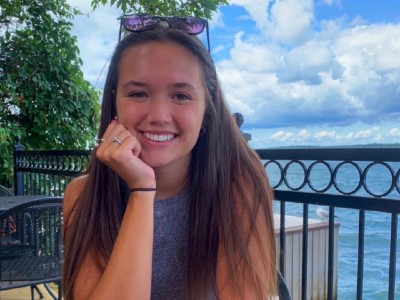
Cameron’s courses link theory and practice for aspiring child life specialists, demonstrating the importance of collaborating between faculty and students.
Through the Center for Teaching and Learning Excellence’s (CTLE) Partnership for Inclusive Education—launched in the Fall 2020 semester—those collaborations are coming together to create culturally responsive learning environments for all students while opening dialogue on how students and faculty perceive teaching and learning.
The program provides faculty with the opportunity to work with one student each semester who is not enrolled in their course. The faculty member and the student share their unique perspectives on teaching and learning. With the input of the student consultant, faculty can reflect on their teaching goals and strategies in the context of one specific course.
“My background is in patient- and family-centered healthcare and child development. I apply theory and practical knowledge as a Certified Child Life Specialist in different contexts. When I heard about the Partnership for Inclusive Education, I immediately was attracted to the idea that the students I work with every day and am here to serve would be given an opportunity to collaborate right in the classroom to elevate the student learning experience,” says Cameron.
Rachel Hill, a senior biology major from Rochester, New York, came to the program through her own experience as well. “The idea of partnering with a faculty member to help them make their class more inclusive struck my attention. I have taken classes that haven’t been structured in a friendly manner and I wanted to help!”
Hill and Cameron collaborated on HFS 255: Interpersonal Competence, which helps students gain the skills to partner with people receiving services. Hill, who is also minoring in marketing and psychology, found it interesting to think about teaching and learning outside of her area of study.

“Professor Cameron was a pleasure to work with. She really listened to me and respected my thoughts and ideas about how to relate to her students and help them better engage with the course material. I learned how to observe and work with someone on solving a greater problem while making impactful change. I can use this experience in the future when working on a team and needing to come up with useful strategies to address a problem we’ve identified,” Hill says of the experience, which will benefit her after graduation.
For Cameron, working with Hill represented a true partnership, providing a nonjudgmental space to think about restructuring part of her course and helping her be better at what she does.
“It’s really about the student experience and academic achievement. There’s a power dynamic in higher education. In my field, working with children and people with disabilities, we say ‘Nothing about us without us.’ The opportunity to make students part of the conversation and empower them to improve their academic achievement, their success and their interpersonal competence works extremely well,” adds Cameron.
For her part, Hill says, “I learned a lot about being transparent and how that creates trust. I didn’t think it would be so natural and easy working with a professor, but I always felt like an equal with Professor Cameron.”
Faculty who are interested in collaborating with a student in the program can learn more by emailing the Center for Teaching and Learning Excellence. Students who are interested in being consultants and are looking for a rich reciprocal educational experience should contact Carla Ramirez.
A Syracuse University News story by Ellen de Graffenreid originally published on Thursday, February 17, 2022.
